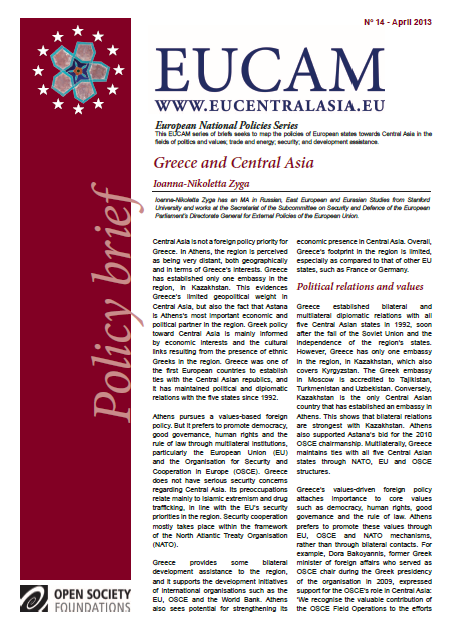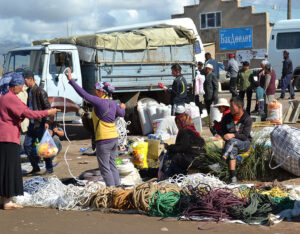European National Policies Series – Greece and Central Asia

Central Asia is not a foreign policy priority for Greece. In Athens, the region is perceived as being very distant, both geographically and in terms of Greece’s interests. Greece has established only one embassy in the region, in Kazakhstan. This evidences Greece’s limited geopolitical weight in Central Asia, but also the fact that Astana is Athens’s most important economic and political partner in the region. Greek policy toward Central Asia is mainly informed by economic interests and the cultural links resulting from the presence of ethnic Greeks in the region. Greece was one of the first European countries to establish ties with the Central Asian republics, and it has maintained political and diplomatic relations with the five states since 1992.
Athens pursues a values-based foreign policy. But it prefers to promote democracy, good governance, human rights and the rule of law through multilateral institutions, particularly the European Union (EU) and the Organisation for Security and Cooperation in Europe (OSCE). Greece does not have serious security concerns regarding Central Asia. Its preoccupations relate mainly to Islamic extremism and drug trafficking, in line with the EU’s security priorities in the region. Security cooperation mostly takes place within the framework of the North Atlantic Treaty Organisation (NATO).
Greece provides some bilateral development assistance to the region, and it supports the development initiatives of international organisations such as the EU, OSCE and the World Bank. Athens also sees potential for strengthening its economic presence in Central Asia. Overall, Greece’s footprint in the region is limited, especially as compared to that of other EU states, such as France or Germany
Political relations and values
Greece established bilateral and multilateral diplomatic relations with all five Central Asian states in 1992, soon after the fall of the Soviet Union and the independence of the region’s states. However, Greece has only one embassy in the region, in Kazakhstan, which also covers Kyrgyzstan. The Greek embassy in Moscow is accredited to Tajikistan, Turkmenistan and Uzbekistan. Conversely, Kazakhstan is the only Central Asian country that has established an embassy in Athens. This shows that bilateral relations are strongest with Kazakhstan. Athens also supported Astana’s bid for the 2010 OSCE chairmanship. Multilaterally, Greece maintains ties with all five Central Asian states through NATO, EU and OSCE structures.
Greece’s values-driven foreign policy attaches importance to core values such as democracy, human rights, good governance and the rule of law. Athens prefers to promote these values through EU, OSCE and NATO mechanisms, rather than through bilateral contacts. For example, Dora Bakoyannis, former Greek minister of foreign affairs who served as OSCE chair during the Greek presidency of the organisation in 2009, expressed support for the OSCE’s role in Central Asia: ‘We recognise the valuable contribution of the OSCE Field Operations to the efforts of their host countries to build strong democratic institutions and vibrant civil societies. In this respect, we believe that additional attention should be given to the development of the Organisation’s presence and contribution in Central Asia’.(1)
Greece’s policy toward Central Asia is informed by economic considerations, especially in the field of energy. It is also based on cultural ties, since there are many ethnic Greeks in Central Asia. According to the Greek ministry of foreign affairs, 10-12,000 people of Greek descent live in Kazakhstan and approximately 700 in Kyrgyzstan. The Greek language is taught in Kazakhstan, Kyrgyzstan and Uzbekistan, and students from the region, especially from Kazakhstan and Uzbekistan, study at Greek universities. In the words of Bakoyannis, ‘We must invest in our relations with energy producing countries, in which we have a very big and important diaspora, which serves as the basis and bridge for our cooperation’.(2)
Greek government officials and their Central Asian counterparts meet frequently. Contacts intensified in the run-up to the Greek OSCE chairmanship in 2009. In preparation for the chairmanship, Bakoyannis capitalised on meetings she had with her Central Asian counterparts during the EU-Central Asia Security Forum held in Paris in 2008. Most recently, in early October 2012, the Greek deputy minister of foreign affairs, Kostas Tsiaras, met in Athens with his Kazakh counterpart, Rapil Zhoshybayev. In September 2011, Greek Foreign Affairs Minister Stavros Lamprinidis met with his Kazakh counterpart, Yerzhan Kazykhanov, within the context of the 66th United Nations Assembly. In 2010, Greek Deputy Foreign Affairs Minister Dimitrios Droutsas attended the OSCE Astana Summit, and in June 2011, he participated in the World Economic Forum for Europe and Central Asia. Greek Prime Minister George Papandreou visited Astana in 2010 to participate in the OSCE Summit and met with Kazakhstan’s president, Nursultan Nazarbayev. In the same year, Droutsas met with the Tajik minister of foreign affairs, Hamrokhon Zarifi, at the 65th General Assembly of the United Nations. Kyrgyzstan’s president, Askar Akayev, met with his Greek counterpart, Costis Stephanopoulos, in 2004 in the first ever visit to Athens by a Kyrgyz president. In 2009, during the 17th OSCE Ministerial Summit in Athens, Papandreou held bilateral meetings with the Tajik foreign affairs minister, Hamrokhon Zarifi, with the Uzbek minister of foreign affairs, Vladimir Norov, and with Kyrgyzstan’s foreign affairs minister, Kadyrbek Sarbaev. In 2008, a delegation from the Greek foreign affairs ministry visited Kyrgyzstan, and another delegation visited Uzbekistan for the first time in the same year.
In sum, Greece is trying modestly to increase its influence in Central Asia, where its geopolitical influence is not as substantial as it is in other regions. In the Black Sea region, for instance, Greece was a founding member of the Organisation of the Black Sea Economic Cooperation and is the main financier of the organisation’s different agencies. In the Western Balkans, Greece promotes a series of initiatives aimed at encouraging regional development and supporting the European perspective.
Trade and energy
Kazakhstan is Greece’s main trading partner in Central Asia, with a total trade volume of €784.58 million in 2011.(3) Greece’s top export categories in 2011 were clothing, wires and oil-related products, while Greek imports from Kazakhstan included oil, copper, wheat and semolina. Greek companies in Kazakhstan are active in the fields of food, drinks and telecommunication equipment. Greek-Kazakh bilateral trade grew until 2008, but in 2009, volumes decreased by 45.95 per cent because of the economic crisis in Greece. Athens and Astana have signed an agreement on economic and technical cooperation and the two sides are currently negotiating an agreement on promotion and protection of investments.
The trade volume between Uzbekistan and Greece stood at
€8.51 million in 2011, with Greek exports accounting for €7.89 million of that total. Greece mainly exported beauty products, marbles, medicine and olive oil. Uzbekistan’s exports to Greece included copper, oil-related products and cotton-related products; they totalled only €0.62 million in 2011. At present, around 12 Greek companies operate in Uzbekistan in cotton and leather processing and in construction materials. Taking Greece’s values-based foreign policy – largely promoted through the EU – into account, the presence of Greek companies in Uzbekistan’s cotton processing sector might conflict with the position of the European Parliament, which has recently condemned the use of child and forced labour in Uzbekistan’s cotton harvest.
| Country | Exports to Greece in 2011 | Imports from Greece in 2011 |
|---|---|---|
| Kazakhstan | 14th | 90th |
| Kyrgyzstan | 137th | 156th |
| Uzbekistan | 153rd | 78th |
| Tajikistan | 87th | 188th |
| Turkmenistan | 61st | 164th |
| Table compiled from data of the Ministry of Foreign Affairs of Greece | ||
In addition, Greek banks have participated in a programme aimed at the reconstruction of the Uzbek banking sector, and the Greek national bank has signed a memorandum of understanding with the national bank of Uzbekistan. Athens has signed agreements with Tashkent on economic and technical cooperation, as well as on promotion and protection of investments. Because the investment climate in Uzbekistan remains problematic for foreign companies, it is understandable that firms venturing into the country’s economy require some form of protection. However, the agreement may not be enough, given that in the past Uzbek authorities have confiscated the assets of foreign-owned businesses, such as the Turkish-owned Turkuaz shopping centre.
Turkmenistan is Greece’s second biggest trading partner. Trade between the two countries amounted to €24.19 million in 2011. Import and export largely consist of oil and gas industry related products. Bilateral trade between Greece and Tajikistan is very low, amounting to just €6.71 million. Greece imports aluminium and exports beauty products and agricultural machinery. Bilateral trade with Kyrgyzstan is minimal, totalling only €0.53 million in 2011.
Greece supports the EU’s policy of diversifying its energy sources. At present, two rival projects, the Trans-Adriatic Pipeline (TAP) and Nabucco, are competing to transfer natural gas from the Caspian region to EU markets in order to alleviate Europe’s dependency on Russia. Athens favours the construction of the Trans-Adriatic Pipeline. Nabucco would bypass Greece, but TAP would bring gas to Europe through Greece, Italy and Bulgaria. As part of Greece’s pipeline diplomacy, in mid-February 2013, Greece, Italy and Albania signed an inter-governmental agreement backing the proposed TAP pipeline.
Kazakhstan has expressed interest in participating in the Burgas- Alexandroupolis oil pipeline.(4) However, following Bulgaria’s withdrawal from the project, prospects are bleak. Greece is interested in Central Asia’s energy sector, but it would prefer to act within the framework of the EU rather than on a bilateral basis, because it recognises Russia’s traditional influence in the region and does not want to risk sending negative signals to Moscow. Athens also sees potential in participating in the development of Central Asia’s renewable energy sources.
Security
Greece is not directly threatened by security challenges in Central Asia. Its indirect security concerns involve terrorism, drug trafficking and energy security, as reflected in Bakoyannis’s discussions with her Central Asian counterparts during the EU- Central Asia Security Forum in 2008. Regional instability could have negative consequences for the country’s trade interests. Greece is not directly involved in bolstering stability in Central Asia, but as a member of the EU, OSCE and NATO, Greece supports multilateral efforts to promote stability in the region. Greece also backs stability in Afghanistan. From 2002 to late November 2012, it maintained a mission in Afghanistan that took part in building and refurbishing infrastructure, distributing aid and training Afghan forces. At present, seven Greek air force trainers are deployed in Afghanistan to help train the Afghan air force.(5)
The Greek OSCE chairmanship emphasised the organisation’s role in achieving stability in Afghanistan and its neighbouring countries, based on its expertise in police training and border management and its history of activity in Central Asia. The Greek chairmanship’s Concept Paper stated that ‘the OSCE’s engagement with Afghanistan should remain among the priorities of the Organisation’ and that the OSCE ‘should be ready to rise to the challenge of contributing to international efforts aimed at enhancing stability and security in the wider Central Asian region’.(6) The Greek chairmanship also recognised the important coordinating role that the UN can play in the region.(7) During its tenure, Athens set as a priority the strengthening of the OSCE’s efforts in security and border management, and in this context, Afghanistan was also prioritised. Moreover, Greece advocated for the OSCE to provide expertise through its offices in Central Asia to Afghan experts on topics such as border management, security and combating drug trafficking.(8)
Greece regularly participates in exercises within the framework of NATO’s Partnership for Peace programme, which highlights the Alliance’s commitment to regional security in the Central Asian region. Military officers from the Central Asian countries attend courses at NATO training centres, some of which are hosted by Greece. Under Greece’s Military Educational Assistance programme, military officers from the Commonwealth of Independent States (CIS) have the opportunity to attend Greek military institutions.(9) Athens maintains no military presence in Central Asia and bilateral cooperation in this area is practically non-existent. Greece has no defence industry interests in Central Asia.
Development assistance
Greece provides bilateral development assistance through the General Directorate for International Development Cooperation (Hellenic Aid) of the Greek Ministry of Foreign Affairs. Hellenic Aid’s development assistance plans are revised annually. Bilateral development aid to the Central Asian republics is not substantial, since the region is not a foreign policy priority for Greece. There are no major Greek initiatives in the region. Greece mostly emphasises cultural cooperation and food assistance, supporting education initiatives in Kazakhstan and Uzbekistan and providing food assistance to Kyrgyzstan and Tajikistan, the region’s poorest countries. Since 1972, Greece has supported an archaeological mission in the Karakum desert in Turkmenistan’s Gonur Tepe region. Greece provides little to no support to civil society in Central Asia.
| Year | 2006 | 2007 | 2008 | 2009 | 2010 | 2011 |
|---|---|---|---|---|---|---|
| Kazakhstan | 0.12 | 0.28 | 0.43 | 0.33 | 0.33 | 0.2 |
| Kyrgyzstan | 0.008 | 0.05 | 0.10 | 0.11 | 0.05 | 0.06 |
| Uzbekistan | 0 | 0 | 0.22 | 0.008 | 0 | 0.008 |
| Tajikistan | 0 | 0.06 | 0 | 0 | 0.015 | 0.008 |
| Turkmenistan | 0.14 | 0.22 | 0.36 | 0.30 | 0.028 | 0.27 |
| Table compiled from data from Hellenic Aid Original figures in USD converted to EUR by author |
||||||
The five Central Asian states were included in Greece’s ‘priority countries’ for foreign aid for the first time in 2008.(10) Table 2 shows the quantity of bilateral aid provided by Greece to Central Asia for the years 2006-2011. Due to Greece’s economic crisis, development assistance to the region has declined since 2009.
Unlike the Central Asian states, Afghanistan is one of ten countries in which Greece significantly increased its development aid activity in the period 2002-2010.(11) Multilaterally, Greece supports development aid programmes in the region implemented by international organisations such as the UN, the EU, the European Bank for Reconstruction and Development and the World Bank.
Conclusion
Central Asia is not a priority on Greece’s foreign policy agenda. It is seen as a distant region that Greece, like many other European countries, knows little about, and in which it has few substantial interests. Central Asia will probably not become a priority for Greece in the foreseeable future. Given the country’s difficult economic situation and the closure of diplomatic missions to reduce costs, Greek diplomatic presence in the region will probably not be strengthened in the short term.
Greece’s contribution to the strengthening of EU-Central Asia relations will most likely be less substantial than that of other European countries that are more active in the region. However, Athens sees potential for deepening economic and trade relations with the Central Asian republics. It will thus continue to strengthen bilateral ties, particularly with Kazakhstan and Uzbekistan, which Athens perceives as the strongest players in the region. At the same time, it will support EU, OSCE and NATO policies in the region.
- Organisation for Security and Cooperation in Europe, ‘Analytical concept paper on the program of the Greek OSCE Chairmanship 2009: The future of the OSCE viewed as Thesis and Antithesis in Harmony’, OSCE Chairmanship, January 2009, http://www.osce.org/cio/35824, pp. 3-4.
- ‘Diloseis Bakoyanni se themata asfaleias kai senaria anashimatismou [Bakoyannis’s statements on security issues and reshuffle scenarios]’, Express, 18 September 2008, http://www.express.gr/news/politics/77134oz_2008091877134.php3.
- Figures in this section are from the Ministry of Foreign Affairs of Greece, ‘Enimerotiko simeioma Dimeron Oikonomikon Sxeseon Ellados- Kazakhstan [Briefing note on bilateral economic relations between Greece and Kazakhstan]’, Agora.mfa.gr, April 2012, http://www.agora.mfa.gr/appdata/documents/B2/%CA%C1%C6%C1%CA%D3%D4%C1%CD%20%C1%D0%D1%C9%CB%C9%CF%D3%202012.pdf.
- Kazinform, ‘At the St. Petersburg summit Kazakhstan Energy Minister discusses Kazakhstan’s participation in the Burgas-Alexandroupolis project’, Government of the Republic of Kazakhstan, June 2007, http://en.government.kz/site/news/062007/08.
- ‘Oloklirothike i Elliniki Apostoli sto Afghanistan [Greek mission in Afghanistan completed]’, Capital, 29 November 2012, http://www.capital.gr/News.asp?id=1678100.
- Organisation for Security and Cooperation in Europe, op. cit.
- Dora Bakoyanni, ‘Omilia sto Symvoulio Asfaleias tou OHE gia tis proteraiotites tis Ellinikis Proedreias ston OASE [Speech at the United Nations Security Council on the priortites of the Greek OSCE chairmanship]’, Dora on the Web, 27 February 2009, http://www.dorabakoyannis.gr/db/gr/grafeiotypou/1919/omilia_sto_sumvoulio_asfaleias_tou_ohe_gia_tis_proteraiothtes_ths_elhnikhs_proedrias_ston_oase.html.
- Ibid.
- ‘Kodikopoiisi tis Politikis Xeirismou Thematon tou Programmatos Stratiotikis Morfotikis Voitheias [Encoding of the policy of handling military educational assistance programme related issues]’, Trapeza Nomikon Pliroforion Isocratis, 2 November 2011, http://www.dsanet.gr/Epikairothta/Nomothesia/ya380_11.htm.
- General Directorate for International Development Cooperation, ‘Etisia Ekthesi 2008, Trito Meros. Geografiki kai Tomeaki Katanomi tis Voitheisa [Annual Report 2008, Geographical and Sectoral Distribution of the Greek Development Assistance]’, Hellenic Aid: Ministry of Foreign Affairs of Greece, 2008, http://www.hellenicaid.gr/images/stories/docs/ydas3_ektheseis/2008-report-gr-3.pdf, p. 68.
- General Directorate for International Development Cooperation, ‘Chores kai Tomeis Proteraiotitas. H Elliniki Anaptyxiaki Politiki [Priority Countries and Sectors. The Greek Development Policy]’, Hellenic Aid: Ministry of Foreign Affairs of Greece, 20 November 2012, http://www.hellenicaid.gr/ellenike-anaptuxiake-politike/khores-kai-tomeis-proteraiotetas/khores-kai-tomeis-proteraiotetas.html.



![shutterstock_1240181551 [Omgezet]](https://eucentralasia.eu/wp-content/uploads/2024/10/shutterstock_1240181551-Omgezet-300x248.jpg)



